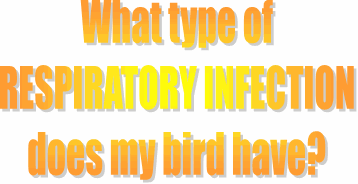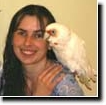
Whenever an owner of a Gouldian Finch or a Canary hears their bird making distinct respiratory noises (wheezing, clicking, raspy sucking, sneezing, coughing, open mouth breathing or if they see excessive beak wiping) their first thought should be
AIR-SAC Mites
However these same symptoms can also be an indication of a BACTERIAL, FUNGAL or PROTOZOA respiratory infection. If you have a local avian vet that you take your birds to, the best course of action would be to arrange a visit with him/her and find out the exact cause of the symptoms you are hearing. However most of us do not have an avian vet close enough to consult with in such a situation.
If this is the predicament that you find yourself in, I would like to offer some suggestions as to how you might make an educated guess as to the cause of your bird’s distress.
If you have Lady Gouldians or Canaries your flock should already be on a regular treatment program for air-sac mites, so if you are hearing just one or two birds making the unusual sounds, I would separate them from the rest of the flock by placing them in a warmed hospital cage and do another treatment with either S76 or Scatt. No matter which product you are using, I would apply the drop of insecticide directly to the skin, rather than using S76 in the drinking water.
If you are using Scatt, this would be 1 drop, directly onto the skin, under the feathers, in the middle of the back. This will remain in your bird’s bloodstream for 3 weeks. When using S76, you should apply one drop in the same place, but you would need to do it for 5 days in a row since S76 will only remain in the bloodstream for 24 hours after each application.
If the symptoms disappear within 48 hours, you will know that the problem was simply an increase in numbers of adult air-sac mites due to a stressful situation your bird may be experiencing, such as breeding or molting. If the symptoms disappear, I would recommend reassessing the treatment schedule that you have been using to keep air-sac mites under control, or possibly setting up a rotating system with Scatt and S76.
If the symptoms do not subside within 48 hours, then your birds have one of 3 types of respiratory infection…BACTERIAL, FUNGAL or PROTOZOA. Each type of infection is caused by a different organism and each type of infection will require a different medication.
THERE IS NOT ONE DRUG THAT WILL CURE ALL THREE TYPES OF POSSIBLE INFECTION!
A process of elimination
So let’s discuss the different conditions that will cause each type of infection so that we might make an educated guess as to which it might be. I do not like treating with all 3 medications at the same time for several reasons.
1. If the infection is cured by using all 3 medications at once, you will not know what had caused the infection to begin with and therefore will not be able to correct the conditions that caused it in the first place.
2. Using a medication that is not required can cause an imbalance in the flora of your bird’s digestive tract and make matters worse for an already ill and stressed bird.
Wet Environments?
All 3 types of respiratory infections…fungal, protozoa and bacterial infections are more likely to occur if your aviary is in a moist, humid environment like a damp basement, or if your birds are living outdoors where the humidity level remains between 50% and 90% for long periods of time. Therefore it is important to control the humidity levels in the environment where your birds reside. I have found a humidity level no higher than 45% to be ideal in maintaining the health of my Gouldians and Canaries. You should assess the humidity level in your aviary with the use of a humidistat.
Fungal Infections
Fungal infections are caused by fungal toxins that can be found in damp, wet seed, corn cob bedding that has gotten wet, old food, air-conditioners, humidifiers and wet cages. When your bird inhales these airborne toxins it will display all of the same symptoms as a bird having an air-sac mite infestation.
Fungal toxins will be found in contaminated seed that has been wet, allowing growth of fungal organisms which your bird will ingest if they eat the contaminated seed or inhale once the organisms become airborne. If your seed mix does not contain any filament fibers indicative of fungus and it is not covered with a grey or white, powdery fungal substance and it has a fresh, nutty smell, I would not suspect the seed as a problem. I recommend always buying your bird seed mixes from reputable sources. This is your best bet to obtaining the freshest seed possible from the most recent harvest. It is always best to place your seed dishes away from water bowls and bottles, as well as bathing areas, to prevent water being splashed into the seed and creating an unsafe situation for your birds. Even in dry environments contaminated seed that gets wet from splashing birds will develop a dangerous condition if your birds ingest it after the toxins begin to grow.
Leaking water bottles
If you find damp or wet places in the trays of your cages, or on the floor of your flights, check for and eliminate dripping water bottles and excessive water puddles after your birds bathe. These places will promote the growth of “wet disease organisms which will contaminate the air and/or settle on your bird’s food causing respiratory infections. Both the inhaled and ingested form of fungal toxins are potentially life threatening.
Nystatin or Medistatin (a powdered form of Nystatin) would be the drug of choice if your bird has a fungal infection at any point along it’s digestive tract (ingested form), but Nystatin does not cross into the blood stream from the digestive tract, so because it cannot come into direct contact with the fungal organisms in a bird’s respiratory tract, it will not cure a fungal respiratory infection.
Fungilin® used to be given for respiratory fungal infections, but it is no longer available from Squibb. Fungilin® contained Amphotericin-B. Vetafarm, an Australian company, produces a water-soluble yellow Amphotericin-B based powder called Megabac-S. You can sometimes find it on-line or it may be purchased directly from Vetafarm as long as you do not live in Australia. It is a very pricey medication.
All other medications needed to cure a respiratory fungal infection must be obtained from an avian vet after a thorough examination. With this information in mind, it would be best for your birds if they never develop a fungal respiratory infection, so keeping a dry environment (below 45%) and practicing good husbandry techniques where they live is your best bet for preventing respiratory fungal infections. If you have eliminated the various causes of fungal infections and your birds are living in a dry environment, then you can be fairly certain that your bird’s respiratory distress is not caused by a fungal toxin.
Protozoa Infections
The protozoa infection commonly found in pet finches that causes what appear to be respiratory symptoms is Trichomonas, commonly referred to as Canker. This flagellate protozoa is associated with damp, wet environments and are found most often in finches housed outdoors with direct contact with the ground. But these organisms can be carried into your aviary by an infected new bird and will begin to multiply in your flock once the water dishes are contaminated with feces from the infected bird. This is a perfect case in point for maintaining separate housing for quarantining your new birds.
Trichomoniasis is not actually a respiratory infection. It most often infects the crop and esophagus and causes the birds to waste away because the ulcers in the crop make it very difficult for the birds to eat. Birds with Trichomoniasis will often produce excessive mucus which will be discharged from their mouth and nostrils. You may find feathers on their face and shoulders which look wet, but are actually dry and stiff from the discharged mucus. They will sometimes be seen blowing bubbles. This mucus is what causes the raspy breathing and beak rubbing.
Trichomoniasis is treated with Ronidazole which is found in Ronivet-S. If caught in time, Trichomoniasis can be cured and your bird’s symptoms will disappear within 3-4 days, although I would continue the treatments for a full 7 days. In cases where the bird has been infected for a prolonged period, it would be advisable to treat for 7 days, discontinue for 5 days and then re-treat for another 7 days.
Bacterial Infections
It has been my experience that about 80% of respiratory infections found in caged finches housed indoors are caused by bacteria. But it is always a good practice to eliminate the other 2 types of respiratory infections before reaching for an antibiotic medication automatically.
There are several types of bacterial infections that can affect birds. The most common are Ecoli, Streptococcal and Staphylococcal infections and Ornithosis (Chlamydia). Here again, being able to take your birds to an avian vet for fecal examination and throat culture testing is the most appropriate way to diagnose and treat them. If that is not possible, then you may be able to determine the type of bacteria by a process of elimination.
Bacteria that can infect birds are always associated with the environment, food and water (seed, sand and grit, old food left in the cage, humid areas, wet cages and dusty environments). Unless your birds are living in a hospital “clean room”, all environments are contaminated with bacteria. It is impossible to completely eliminate them. Therefore you should strive to obtain and produce strong healthy birds whose immune systems will protect them from the existing bacteria. Birds that have a low level of natural resistance (poor immune system) will be the first to succumb to bacterial infections. The exact source of the infection must be found and steps taken to eliminate high numbers of the pathogen or they will continue to reoccur in susceptible birds. Strep and Staph infections often occur after other infections (Ornithosis or Polyomavirus) infect weak birds, or when stressful conditions lower the immune system. These stresses could include diets low in protein, energy, vitamins or minerals, cold stress, mite infestations, during courtship, molting and over-crowded housing conditions.
Strep and Staph Infections
There are a number of medications that can be used for Strep and Staph if you get them from an avian vet, but the treatment for Strep and Staph infections that you could obtain on-line from various websites would be a combination medication containing Amoxicillin and Tylosin. My experiences have shown that this type infection probably constitutes 80% of bacterial respiratory infections. This is usually the drug that I have used, especially when there is evidence of swelling in any part of the head in the blue mutation Gouldians. Their weak immune systems allow for recurrent respiratory infections once they enter the stress of the juvenile molt phase. Through the years I have treated many blue mutation Gouldians over and over with the end result being death. This is why it is very important to invest in quality birds of this mutation if you want to begin working with them. It is heartbreaking to watch seemingly healthy juveniles succumb to respiratory infections. Extreme precautions must also be taken with the environment for blue mutation Gouldians to keep them from excessive exposure to high humidity, stress and dusty conditions.
Ecoli Infections
An Ecoli infection would be treated with Trimethaprim Sulfa. Again, there are other drugs that would be dispensed by your avian vet once throat culture testing had been done, but you should be able to find Trimethaprim Sulfa on-line.
Ornithosis Infections
There are fecal and blood tests which can detect Chlamydia (Ornithosis) in our birds, but both must be done by an avian vet or avian testing laboratory. A quick 3 day Doxycycline/Megamix trial test can be done to rule out this type of respiratory infection; however I would not start with this, but rather finish with this test if treatment for Strep, Staph or Ecoli does not eliminate the symptoms.





